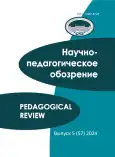The problem of artificial intelligence technology acceptance in the educational environment: Pedagogical resistance and implementation strategies
- Authors: Glukhov A.P.1, Sinogina E.S.1, Lomovskaya S.A.1
-
Affiliations:
- Tomsk State Pedagogical University
- Issue: No 5 (2024)
- Pages: 154-166
- Section: PSYCHOLOGY
- URL: https://journal-vniispk.ru/2307-6127/article/view/269581
- DOI: https://doi.org/10.23951/2307-6127-2024-5-154-166
- ID: 269581
Cite item
Full Text
Abstract
About the authors
Andrey Petrovich Glukhov
Tomsk State Pedagogical University
Email: GlukhovAP@tspu.edu.ru
Tomsk, Russian Federation
Elena Stanislavovna Sinogina
Tomsk State Pedagogical University
Email: sinogina2004@mail.ru
Tomsk, Russian Federation
Sofia Anatolyevna Lomovskaya
Tomsk State Pedagogical University
Email: xxx_sofi_xxx@mail.ru
Tomsk, Russian Federation
References
- Kabudi T., Pappas I., Olsen D. H. AI-enabled adaptive learning systems: A systematic mapping of the literature // Computers and Education: Artificial Intelligence. 2021. Vol. 2. 12 p. https://doi.org/10.1016/j.caeai.2021.100017
- Deursen A. J. van, Dijk J. A. van. The first-level digital divide shifts from inequalities in physical access to inequalities in material access // New Media & Society. 2019. Vol. 21, Is. 2. P. 354–375.
- Rogers E. M. Diffusion of innovations. 5th ed. New York. Free Press, 2003. 576 p.
- Davis F. D. Perceived usefulness, perceived ease of use, and user acceptance of information technology // MIS quarterly. 1989. Vol. 13, № 3. P. 319–340.
- Gursoy D., Chi O. H., Lu. L., Nunkoo R. Consumers acceptance of artificially intelligent (AI) device use in service delivery // International Journal of Information Management. 2019. Vol. 49, Is. 5. P. 157–169.
- Venkatesh V., Morris M. G., Davis G. B., Davis F. D. User acceptance of information technology: Toward a unified view // MIS quarterly. 2003. Vol. 27, № 3. P. 425–478.
- Kashive N., Powale L., Kashive K. Understanding user perception toward artificial intelligence (AI) enabled elearning // The International Journal of Information and Learning Technology. 2020. Vol. 38, № 1. P. 1–19.
- Lin C. Y., Xu N. Extended TAM model to explore the factors that affect intention to use AI robotic architects for architectural design // Technology Analysis & Strategic Management. 2022. Vol. 34, № 3. P. 349–362.
- Kaplan A., Haenlein M. Siri, Siri, in my hand: Who’s the fairest in the land? On the interpretations, illustrations, and implications of artificial intelligence // Business horizons. 2019. Vol. 62, № 1. P. 15–25.
- Zhou H., Huang M., Zhang T., Zhu X., Liu B. Emotional chatting machine: Emotional conversation generation with internal and external memory // Proceedings of The Thirty-Second AAAI Conference on Artificial Intelligence. 2018. Vol. 32, № 1. P. 730–738.
- Song X., Xu B., Zhao Z. Can people experience romantic love for artificial intelligence? An empirical study of intelligent assistants // Information & Management. 2022. Vol. 59, № 2. 10 p. doi: 10.1016/j.im.2022.103595
- Kelly S., Kaye Sh., Oviedo-Trespalacios O. What factors contribute to the acceptance of artificial intelligence? A systematic review. Telematics and Informatics. 2023. Vol. 77. 33 p. doi: 10.1016/j.tele.2022.101925
- Behl A., Chavan M., Jain K., Sharma I., Pereira V. E., Zhang J. Z. The role of organizational culture and voluntariness in the adoption of artificial intelligence for disaster relief operations // International Journal of Manpower. 2022. Vol. 43, № 2. P. 569–586.
- Королева Д. О., Андреева А. А., Хавенсон Т. Е. Шоковая инновация: концептуализация процесса цифровой трансформации образования в период пандемии // Образование и саморазвитие. 2023. Т. 18, № 2. С. 100–117. doi: 10.26907/esd.18.2.08
- Королева Д. О., Науширванов Т. О. Digital countries. Особенности цифровизации образования в России, Венгрии и Германии // Образовательная политика. 2021. № 3 (87). С. 106–118. doi: 10.22394/2078-838X-2021-3-106-118
- Gansser O. A., Reich C. S. A new acceptance model for artificial intelligence with extensions to UTAUT2: An empirical study in three segments of application. 2021. Technology in Society. Vol. 65. 15 p. doi: 10.1016/j.techsoc.2021.101535
- Chatterjee S., Bhattacharjee K. K. Adoption of artificial intelligence in higher education: a quantitative analysis using structural equation modelling // Education and Information Technologies. 2020. Vol. 25. P. 3443–3463.
- Tran K., Nguyen T. Preliminary research on the social attitudes toward AI’s involvement in Christian education in Vietnam: promoting AI technology for religious education // Religions. Vol. 12, № 3. 20 p. doi: 10.3390/rel12030208
- Сидорова Т. А. Образы восприятия и концептуализация антропологических вызовов искусственного интеллекта // ΠΡΑΞΗMΑ. Проблемы визуальной семиотики (ΠΡΑΞΗMΑ. Journal of Visual Semiotics). 2024. Вып. 1 (39). С. 102–119. doi: 10.23951/2312-7899-2024-1-102-119
- Валеев А. С., Худайбердина С. Р., Валеева Г. Х. Оценка отношения педагогов организаций высшего и среднего профессионального образования к инновациям в управлении образованием // Мир науки. Педагогика и психология. 2023. Т. 11, № 2. С. 12.
Supplementary files






